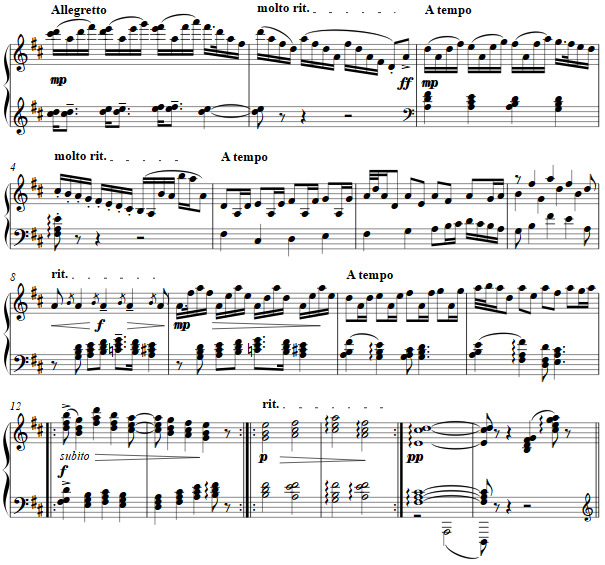Music and Texts of GARY BACHLUND
Vocal Music | Piano | Organ | Chamber Music | Orchestral | Articles and Commentary | Poems and Stories | Miscellany | FAQs
On "Du hast die Gans gestohlen" - (2017)
for piano
Zu einem unbekannten Veganerin
Sources of inspiration abound.
From a news item, one hears: "The storybook town of Limburg an der Lahn in Hesse enjoys serenading its residents with melodies played by its town hall glockenspiel - an instrument made up of chimes, also called a carillon. The tunes included the classic 19th century children’s song Fuchs, Du hast die Gans gestohlen - 'Fox, you stole the Goose'. That is, it included the folk tune until a vegan woman complained." In "Vegan’s protest leads town hall to ban kids' song about fox being shot," TheLocal,de, 9 February 2017.
The children's song in question was composed by poet and composer, Ernst Anschütz (1780-1861), and originally titled "Warnung," while the melody was adapted from an older folk tune. The same Ernst Anschütz authored "O Tannenbaum." The folk-like children's song was commemorated with a postage stamp in a children's series. The first verse is: "Fuchs, du hast die Gans gestohlen, / gib sie wieder her! / Sonst wird dich der Jäger holen, / mit dem Schießgewehr."
What is one then to make of the complaint against the tune -- played on a municipal carillon and without lyrics being sung? One learns the "vegan" was upset by the reference to a firearm, as the hunter is called. [ 1 ] Some press made light of the reported fact that the woman is a vegan, as perhaps sentiment were linked to other political stances as regards foxes, fox hunting, the farming, clothes-making and wearing of fur, and so on. As to issues of weapons, one wonders how this individual complaining about a musical reference would deal with Prokofiev's Peter and the Wolf? Or the fairy tale of Red Riding Hood. those "big ears and teeth" and more. What of Carl Maria von Weber's Der Freischütz?
2 pages, circa 2' 30" - an MP3 demo is here:
The score is available as a free PDF download, though any major commercial performance or recording of the work is prohibited without prior arrangement with the composer. Click on the graphic below for this piano score.
On "Du hast die Gans gestohlen"
NOTES
[ 1 ] Some media in German editorializes this as an unexpected 'shit storm,' vocabulary borrowed from English: "Das Kinderlied 'Fuchs, Du hast die Gans gestohlen' wurde aus dem Glockenspiel der Stadt Limburg verbannt. Dass er damit einen Shitstorm anzetteln würde, damit hat der Bürgermeister nicht gerechnet." In "Stadt ändert Glockenspiel-Melodie 'Fuchs, Du hast...“ by Sandra Saatmann, Welt N24, 9 February 2017.
The mayor offered some time off for the offending tune. "Die Frau, so Stadtsprecher Johannes Laubach am Donnerstag, stoße sich insbesondere an der Liedzeile 'Sonst wird dich der Jäger holen, mit dem Schießgewehr'. Die Veganerin arbeite in Hörweite des Glockenspiels in einem Büro, erklärte Laubach. Weil ihr der Text, obwohl dieser glockenspielbedingt gar nicht zu hören ist und wohl nur im Kopf mitläuft, Unbehagen bereite, bat sie den Bürgermeister um Abhilfe. Dieser, Marius Hahn von der SPD, wollte offenbar kein Ungutmensch sein und verbannte das Lied fürs Erste aus der Liste. 'Wir geben der Gans eine Schonzeit und tauschen immer mal wieder die Musikstücke", so Laubach. Man habe 33 Lieder im Repertoire, überwiegend deutsche Volkslieder. Der Bürgermeister versicherte, dass es sich nicht um ein ideologisch motiviertes Einknicken handle'." In "Veganerin bringt 'Fuchs, Du hast die Gans gestohlen' zum Verstummen," Die Presse, 9 February 2017.
The politician promises that there was no ideological motive in this decision. Why then the request, to begin with?
Some noted the anti-weapons sentiment: "Bürgermeister Dr. Marius Hahn (45): 'Sie ist zu mir gekommen und hat freundlich gefragt, es nicht mehr zu spielen. Ich wollte ihr einen Gefallen erweisen.' Es sei nicht der Gans-Diebstahl gewesen, der die Dame geärgert habe. Ihr missfällt die im Liedtext geäußerte Drohung: 'Sonst wird dich der Jäger holen, mit dem Schießgewehr'..." In "VEGANSINN in Limburg," by Stefanie Lehmann, Bild, 9 February 2017.
As to issues of weapons and such sensitivity to even an un-sung lyric played by a carillon, one reads: "German weapons manufacturers are making more money than perhaps ever before when it comes to exporting small arms, raking in the highest sales since government record-keeping began in the late 1990s, the German daily Süddeutsche Zeitung reported on Monday. The value of approved exports in 2012 was about double that of the year before, with small arms and their components bringing in some €76.15 million ($98.5 million), the paper said, citing an Economy Ministry response to a parliamentary inquiry by the far-left Left party. The lowest level of small arms exports was €37.9 million in 2011, down from the second-highest level of €70.4 million in 2009. Among the small arms contracts approved in the record year of 2012, Berlin approved some €6.5 million in exports to Saudi Arabia -- a sum that amounted to more than half of such weapons sent to the Middle East and North Africa. Sales of ammunition for these weapons, however, dropped from €34.6 million in 2011 to €18 million in 2012." In "Germany's Small Arms Exports Double," Spiegel, 27 May 2013.
The answer to concerns about weapons, weapons and munitions manufacture and worldwide sales -- in which the United States remains leader -- is to complain about a song text, so as to remove a melody from being played in public by a carillon in a clock tower. Such is the depth of offence, some people find in the littlest of things.
The human political comedy of this is great, and resonates with the historical fact that the National Socialists in the 1930s busied themselves in part with deciding which music was degenerate -- "Entartete Musik." Jewish music was forbidden in that time, among other works. Among the voices of complaint of that time: Hans Severus Ziegler, who stated the decay of music was "due to the influence of Judaism and capitalism."
Now the complaint is about a flintlock, a single shot weapon a hunter would carry circa 1750. One understand that music and even traditional song lyrics are and will remain the target of political views as tyranny, great and small, is such a temptation. Even among the nicest of people.


